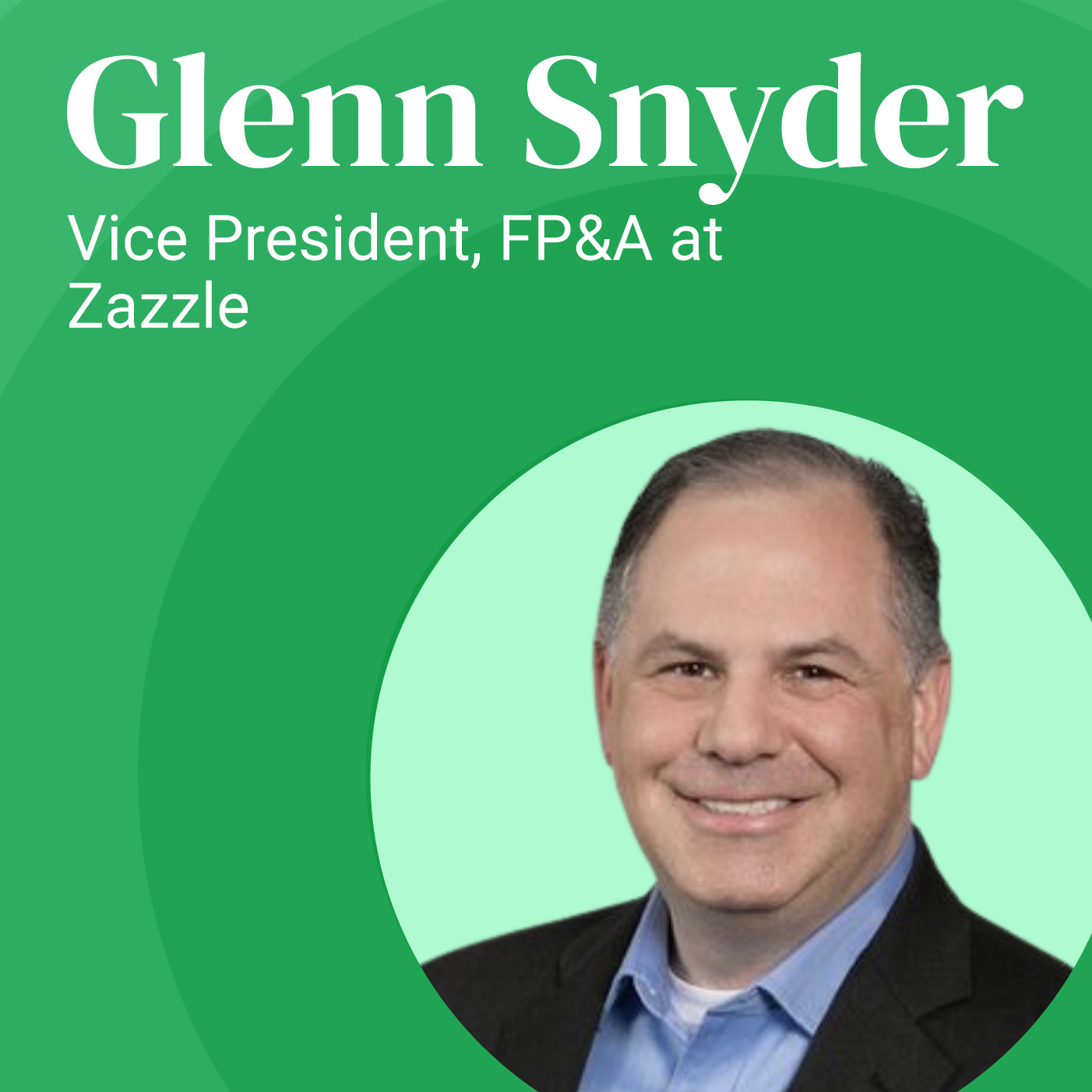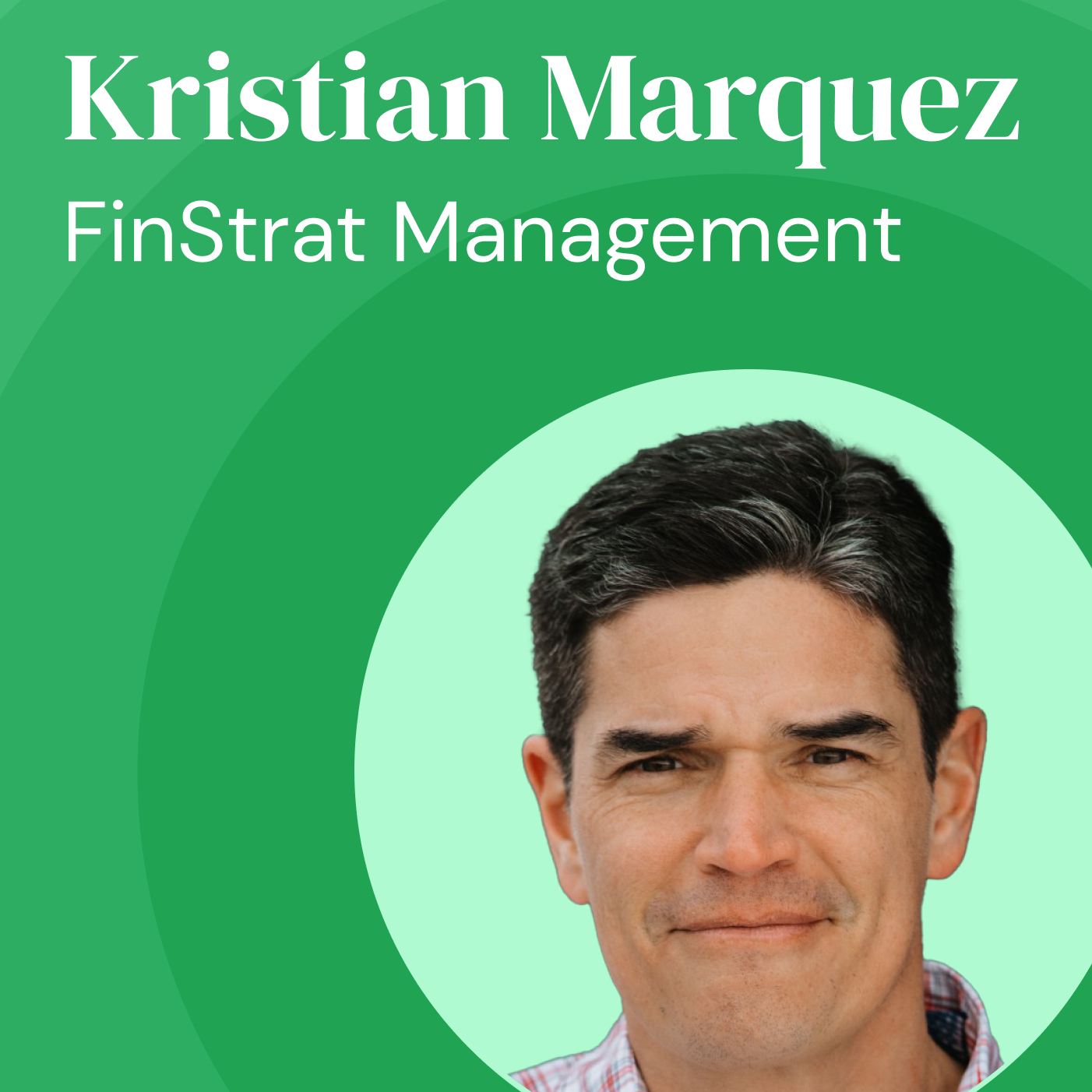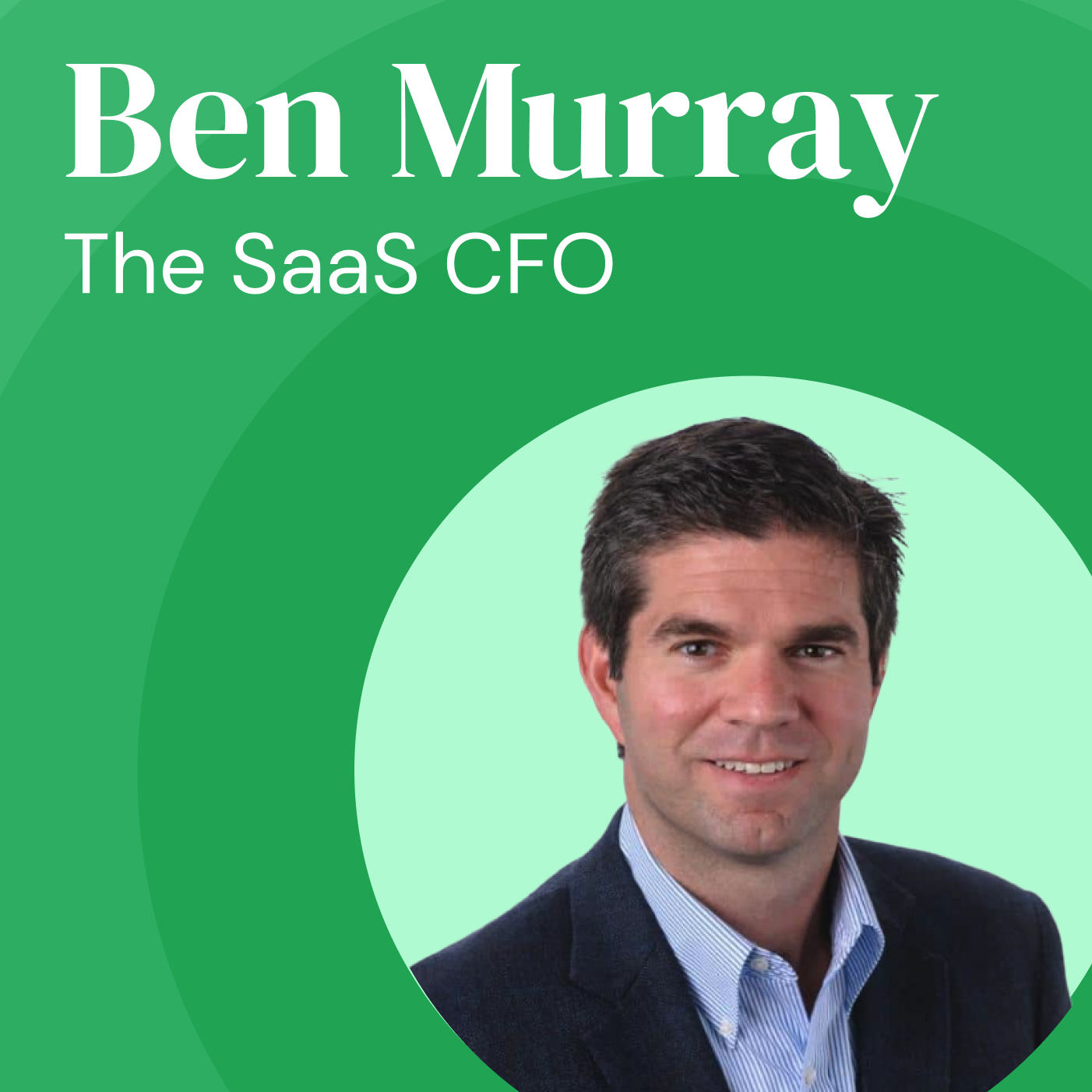FP&A as a Strategic Business Partner | Glenn Snyder
- 0.5
- 1
- 1.25
- 1.5
- 1.75
- 2
- Welcome to Being Planful. I'm really excited. Oh, it's given us a countdown, that's new. Hi everyone, welcome to Being Planful. Today, I'm delighted to be joined by Glenn Snyder. Glenn is the head of FP&A a at Global Growth, and he's had a raft of amazing experiences at some fantastic brands, whether that be enrolls of FP&A, or in strategy. So Glenn, welcome to the show.
- Thanks Rowan, I appreciate you being having me here.
- Yeah, no problems. We love having guests like yourself, that can help our audience listen and learn and understand the role of FP&A better. So why don't you tell the audience a little bit about some of those experiences that I just mentioned?
- Sure, so I started my career, what feels like very, very long time ago, at a large regional bank on the West Coast of the U.S. And I was a commercial loan officer for about three years. And as my position became more about bringing in business, I realized I was not really the sales guy, but I love doing the analysis. I love doing the underwriting. So, I took a little pivot My career, went over to a company called Franklin Templeton. I spent seven years at Franklin, where my first two years in international financial analyst in the FP&A group. And then moved into a group for my last five years, was called Global Portfolio Services. And with basically combination of FP&A and corporate strategy, specifically focused on the portfolio management trading side, of Franklin Templeton, and their portfolio management operations all over the world. After my time at Franklin Templeton, I moved to Visa, where at the time Visa was a not-for-profit company, and I was hired at the director of profitability. So that was a little weird, but I was making a bet that Visa would go through an IPO, because MasterCard had announced that, and two years later Visa did go through their IPO. So all of a sudden I was a director of profitability for a company that was learning how to become profitable. So that was pretty cool. My last year at Visa, so I actually, I should say I was in that role for about four years. And then my last year at Visa, I moved once again into strategy specifically, a global consumer product strategy. So I was doing a lot of the planning analytics strategy around consumer credit, debit and small business, which made up about 90% of Visa's global revenues.
- Yeah.
- After Visa, I moved over to another financial services company called Charles Schwab. I spent five, more than the first two and a half years within corporate FP&A, supporting a whole bunch of different organizations, including international group. I was about to move into a larger role, and move away from International when the executive vice president of International said to me, "Hey, wait a second, I don't want to lose you. How about you come over report to me and runway strategy team?" At which time I said, "You don't have a strategy team." And he said, "Yeah, how about you build one out for me?" So, that was a pretty cool opportunity. So I built out and ran international strategy for Charles Schwab for my last two and a half years. And then I left Schwab, and went to another public company that most people haven't heard of, it's called Digital Realty. They are the second largest data center re in the world. They're in about 19, 20, or so different countries, almost 300 different data centers that they own and manage all over the world. And they're actually in the S&P 500, but they had no corporate FP&A and a team at all. So I was hired as the vice president of corporate FP&A, to build out a team scratch, which was really exciting because I got to really help mold and change the way the company looked at internally, the internal management of its corporate finance area. And I was there for about three and a half years, and then I was approached to go to where I am now, which is Global Growth Holdings. It is a private equity firm, and I am the head of their FP&A. Global Growth itself has about 1.2 billion, or so, in annual revenues and owns about 125-ish, operating companies in 18 different countries.
- Wow, what's really struck me there Glenn was how you've, I dunno danced is maybe the right word, or maybe the wrong word, but dance between FP&A and a and strategy roles, your whole career. Different stints across there. I'd love for you to talk about, FP&A and its similarities, its differences, some of the nuances between that and strategy, or whether you fundamentally believe they are one and the same.
- They're definitely not one in the same, but there is overlap. When you're an FP&A, it's more about the numbers, you got things that are core to FP&A. Budget variance analysis, running budgets, running forecast, those types of things. It's really about the financial team, revenues, the expenses, you could bring in business metrics. And that starts to bridge some of that gap between core finance and strategy. Because now you're talking about what's driving the business. On the strategy side, it's really about more of the external marketplace. Where are you? Where are you going? Very much kind of like a budget, but to do it not necessarily around financials, but around the business itself. How did the competitors come into to play? What about the different market dynamics? Are there different regulations, in different locations, those types of things, that you have to have a much bigger broader perspective. And to be honest with you, Rowan, the way I look at it, and the way I try and manage that FP&A team, is to sit right on that line between strategy and that FP&A, because when you're going over, and you're hoping your business units. Whether it be marketing, or legal, or sales, or operations whatever that the business community is. And you're helping them achieve their goals, you can't just do it from only a finance perspective, because then you're a one-trick pony. You have to go over and look at it in a way the whole circus and say, "What is the customer aspect? The product aspect, the market aspect?" Help that business leader achieve their goals, and now you become a much more valued, and trusted partner to the business than just being their finance support.
- Yeah, so you mentioned before FP&A and strategy the same, but they can join in the middle of the Venn diagram. You love to sit in the middle of that Venn diagram, joining both right?
- That's it exactly. Sometimes it's a fine line to walk--
- Hmm.
- I had an executive that he was the senior vice president of FP&A at Charles Schwab. And he called me into his office one day, and said, "Hey Glenn do you know what? I feel like you're getting a little too close to the business. We have our priorities and finance, you have to be supporting finance." And I explained to him, I said, "I totally understand that." What we do in finance, we bring a certain discipline. We know how to analyze data, we make sure everything ties out, right. We want to make sure that the numbers are aligned, but when you could go over and get closer to the business and take their strategies, their ideas, the direction that they're going, and you'll apply the finance discipline, that line, if you could stay on that line is very, very powerful.
- Yeah, 100%. We talk a lot on this show about the partnership and the advisory that FP&A brings, to the business units. And that's what you're talking about there. The interesting part is you had an executive basically tell you that you will being to partnering right. They're providing almost crossing the line, so to speak--
- Yeah.
- And how do you--
- you to me--
- How do you find, sorry to cut you off there. How do you find that balance right? Between being FP&A and strategy, and what are some of the crucial skill sets that you need, to straddle that line successfully that you talked about?
- The number one thing is something that I was awful at at the beginning of my career. And it's empathy. It's understanding your business partner. When you're sitting across the table from somebody, or you're sitting on the other side of the Zoom meeting, or whatever it happens to be. Put yourself in their position, what do they want, what do they wanna get out of that meeting? What do they need help with? And that's what you, the finance partner should be going in thinking about. Because many times, finance people go in and they say, "Hey, when I'm meeting with my business partner, there are things that I need to achieve, I need explanations for these variances. I need to understand where we're going with our forecast." Whatever that happens to be fine. But, if you're only looking at it from what you need, and not from what the business needs, it's not really a partnership. And so, you got to go and think about, what is it that the business partner needs from me? What else can I be doing? How can I help them? And oftentimes, what happens is, I've run into this at many companies, the business partner, sees you as a finance person, and that's it? "No, no, no, you go over, you do my budget. I'm not interested in talking to you, about other things that are going on. I have my own team that I talked to about those things." If you could be proactive, and be thinking about how to solve their problems without them even asking you. And in those meetings you come back and say, "Hey, look, you know what? Here's your business revenue. Here's what you've been doing. And I went over and I pulled some client data, and I did some client segmentation for you." That's not... From a finance perspective that's really easy to do. "Oh, by the way, here's also, here's a breakdown of your revenue by product. And here's your concentration of revenue within products." And now all of a sudden say, "You know what? I put this little dashboard together." Because we in finance we're good at doing dashboards. We go over and put that together. And now you present that back to the business. And that business leader will typically look at that their eyes will get really big, and they're gonna say, "Oh my God, I didn't know he could do this. I didn't know you could put some of this together. I've been looking for something like this." And now when you could go over and you could marry the financial data, to the business metrics and how the business is actually being measured by the CEO. Now you're finding that sweet spot, that line that you're straddling between strategy and FP&A, and now you become a much more strategic partner than just a finance one.
- And so, you talked about empathy, right. And that being something that you weren't so good at when you first started. Do you have any experiences I guess, or advice of how to get better at that, right? It's not something that comes natural to everyone. And I think it's fair to say that, in finance, we tend to not lead with emotion first, right? We're much more part of the logic brain than the emotion brain. And I think it's a common trait that folks that I talk to that it's a skill that they need to learn. So what advice can you give? Or how can people go and learn to kind of change that behavior?
- The first thing is practice, that's it. You got to go over and you got to practice it. And how do you practice it? You do it by asking questions, you do it by listening. But ask questions about... The person that you're talking to, ask them about what they want, what are their needs? Forget about finance, forget about your role and your needs, ask them about their needs. And then, the next time you go back, think about what they had said were their needs, and see if you could go over and proactively put some kind of solution together for them, that shows the business partner, that you're thinking about them. You're thinking about beyond the finance side of things, but you're trying to get them to where they are... Whatever their problem happens to be, how you could go over and help them solve it. And the more you do that, the more it becomes a habit. And I'll tell you, it's a real quick, funny story. When I was at Charles Schwab, they had everybody take these a survey that's run by Gallup CliftonStrengths. And for different characteristics and says, "Here is what you do really well, and here's where." They don't say that you don't do it well, but it's what you're really strong in, and maybe not so strong in--
- Hmm.
- Out of the 34, number 33 for me with empathy. And when I saw it, I was like, "Oh my God, no, no, no, no, this is not right." And I went over and I talked to the HR person, and I said, "No way." I'm like maybe earlier in my career, but now I think I do this... I've worked really hard to be good at empathy. And the woman says to me from HR, she says, "That's the point. It's not that you can't do it well, is that you had to put an extra effort, and you had to do it. You had to really work at it to become good. It's not that you can't do it." And so it was kind of funny, but it shows you, it is not something that I was doing naturally, but now, I do it without even thinking.
- Yeah, that's great. It's our skills and talents, none of them, I don't think it just given to us. We all have to work at them. There's some that come much easier to us than others. But, one of those, I think it's a skill to be empathetic. And I think some people grow up in environments where they learn it much earlier than many others. And it's just a really interesting trait that we hear a lot of on this show that folks wanna become more empathetic to their business partners. We talked a little bit about how to do that, which was a little bit more about, communication and teamwork. Can you talk about how you have built your teams, especially, some of these fantastic brands. You've led teams, you've been head of FP&A, you've been head of strategy. That's a whole lot of teamwork involved, not only in just the finance world, but the cross-functional collaboration. Talk to us about that concept of communication and teamwork, and how are you trying to instrument that within the teams that you build?
- To be honest with you, it is at the core of success for anything you're doing, is communication and teamwork. Number one, you cannot accomplish anything on your own, especially at a company. You have to be working with other people, people support you, people provide you with information. People are answering questions for you. So you have to recognize you're always part of a team. And the one thing that you that's really important is to one acknowledge the people on the team, because if you are a team member and you're not the team leader, you don't want the team leader to take all the credit for the work you do. So when you become the team leader, make sure you go over and give credit where credit is due. That is a very simple thing. I always look at it when I lead my teams, I don't want anybody to know about anything that I'm doing because I want to set my team up for success. And if my team looks good, if everybody who works for me, if they go and their business partners and whoever they're working with, they come back and say, "Wow, nope, Glenn over there, Glenn's fantastic." And Sally's just such a wonderful person to work with. I naturally get credit because I'm the leader of the team. So I try and put my team in front of me. And that's one of the real important things because, it gives them better exposure. But what's really important, is to make sure you're not setting people up to fail as well. So you always wanna go and practice, rehearse, go through, and double check everything that your team is doing, to make sure that your team is putting their best foot forward. And then if everyone outside the team, sees nothing but success, your team looks great. It's okay to fail. And failure is a great way to learn, but you try and keep those failures within the team. And you as a leader, you wanna capture those, and make sure that the team learns from why that failed, or why that didn't work. So that when they go out to people outside the team, all they do is... Those outside people may see success.
- That's a great mantra to keep the failures within the team, and explain it so people understand, how to improve. When you think about communication and teamwork, there's the hard skills right? Of doing that analyst work, right? And that requires communication, that requires teamwork, but then there's the soft skills of communication and teamwork. How have you... I guess there's two questions here, how have you struck the balance between building a team that has all of the great hard skills that you need to get the job done, need to make sure everything's working, and humming, and building that FP&A machine, and on top, layer in the soft skills to make them a high performing team, that ultimately gets individuals promoted, and gets them moving up their career path?
- Well, the first thing, I'm a big believer in team communication. And everybody has a role. They have to play the role, but they have to be communicating. And I'm a big baseball guy, you could see the baseball is behind me on the wall. So I like to use this little baseball analogy. I could be the greatest shortstop in the world, I could field every single ground ball, I mean, beautiful throws over the first base. But if I don't have a first baseman, who goes and stands on the bag and catches the ball, I get nobody out. So it doesn't really matter how great of a shortstop I am, if I don't have my first basement. So, you have to have those different people playing different roles. And when you're building a team, to build a high-performing team, you don't want everybody with the same skill set and everybody thinking the same way. You want people who have different experiences, who come from different angles. It's always great to be able to promote from within, but at the same time, hiring people from other companies, brings in a different perspective. So it's good to have that kind of mix. And you want to have communication that is completely open. I've always told the people on my team, any time, anywhere they wanna go over, they wanna talk to me, go into the office, we got on a phone call, whatever it happens to be, they can say anything they want in any way. I'm not gonna hold it against them. Different story when we have invite other people into the room, right. But between us, totally open, because I need to know what they're thinking, why they're thinking it. And then I could determine, "Wow, that is a fantastic idea. Yes, let's move forward with that." Or, "You know what? Here's the thing you're not thinking about. And so let's go over and adjust for that to make that idea better." And that type of communication is absolutely critical. So to me, it's just that open door policy, say anything, throw it up on a Blackboard, or a whiteboard, or whatever, and just throw the ideas out there, and there are no bad ideas. In fact, I'll tell you a quick little story. When I was at Franklin Templeton, this was my first true FP&A role. I drove my boss nuts, I would walk into her office probably right once a week and said, "Hey, I got this great idea, what if we did this?" Nine times out of 10 she was like, "No, that's an awful idea, here's why get out." And I was like, "Okay, fine." But one out of every ten, she would come back and say, "Oh, that's a really good idea. Okay, let's go and do that." And we came up with stuff that changed the way the company worked. So, it was really cool, but if I said, "Well, wait a second. My hit ratio is only 10%. So maybe I shouldn't be wasting her time on those ideas. I probably wouldn't be coming up with those ideas that actually work." Two things happen when you throw out ideas. Number one, it's a great idea that could change the company, or number two, it's not a great idea, but you learn why. Either one of those outcomes is a really positive thing. So I highly encourage my team, to just constantly be brainstorming and pitching ideas. And let's talk through that. You don't want people start running off, "Hey, I got this great idea. I'm gonna go work on it until it's solved." Because there might be going down the wrong path. At the very beginning, do a little brainstorming, make sure everybody's on the same page. If it's a great idea, great move forward with it. If it's not a great idea, that's a great learning opportunity for the employee.
- And how do leaders in that scenario at Franklin Templeton, your leader obviously had created a space and environment, where you felt comfortable doing that, right. You're taking someone's very valuable time--
- Yeah.
- I'm sure that, right. And you've got a one out of 10 hit rate, obviously, it took that one home run to help you kind of get the permission to keep going back, right. But, how do you create that space--
- Yeah.
- As a leader folks to do?
- So, to be honest with you, I got yelled at a lot. It wasn't something that she was like, "Hey, here's the approach I want to take with the team." It really comes down to something that I look for, in employees. And to me, it's one of the most overlooked things in any role, and that's courage. You have to have the courage to go over and put yourself out there and say, "Hey, I got an idea." Now you don't do it publicly, you don't do it in front of the CFO those types of things, but you go to your direct manager and you say, "I got this idea." And have the courage to be willing to pitch it. And to be willing to be rejected, that's okay. Once again, learning opportunity. To be honest with you, I mean, I wasn't kidding when my boss said, get out, because many times she actually said, "Get out of my office, you're wasting my time." So I had to have a little bit of a thick skin there, into absorb those. And so, not every boss is really open to that saying, "Yeah, pitch me on your ideas." To me as a leader, I never want to shut down that creativity for my team, because that's when you miss the great opportunities. And it's also a great opportunity to teach your staff. So for me, I always try and encourage that. Not every boss is like that. However, I look at it as, you as an employee, it's up to you, to go over and have that courage, to propose those ideas, to have that conversation. That doesn't mean you go into someone's office and interrupt a meeting, or when they're on a phone call and say, "Wait, I hang up the phone, I got an idea." But, you look for the right opportunity, you send them a little IM, or an email and said, "I got something like to run by you, let me know when you have five minutes." And most bosses will go over and say, "Oh yeah, you know what? Come by at this time," or whatever. And then you wait for that right moment. But, it's something that you as an employee is a great way to stand out. And one of the big things, maybe it goes back to, the technical skills and the soft skills Rowan, that you were talking about before. The technical skills allows you to come up with a potential solution. It's the soft skills that when you were pitching it, and that idea that big picture, "Hey, here's what would fit in. And here's that problem that maybe I wasn't even asked to solve, that I might be able to solve." It's showing that you can come up with those ideas and see them through, that makes people think about you at a whole different level. And that's really those soft skills, that will allow you to advance through the organization.
- Yeah, you called it courage, Glenn. I would call it courage with persistence. There's one thing to be courageous, and is a second thing to be courageous on a frequent basis.
- Yes, and some of the things that... And to be honest with you, what really drives it after a while is confidence. You're gonna go over yeah, you're gonna fail at some things. You're gonna get some things wrong. The biggest thing is when you fail at something, don't repeat the mistake, learn from it. As long as you could do that, you're gonna go forward on things. But, those one or two successes that you have, start to build and grow and you get more and more as you start seeing that bigger perspective, you're brought into other meetings that go over and teach you more about the organization, that makes you more valuable, help you come up with more ideas and so on. And then, the really challenging part is when you're in that meeting with 20 other people, and you go and you say, "Wait a second, I have an idea." And to be able to say that in front of a bunch of executives, that really comes from confidence. Early in my career, I probably was not doing that, certainly not as often as I do it today, but it is one of those things that as you start getting a sense that, "Hey you know what? My ideas are actually not that bad." And you start seeing some of those successes, you it builds that confidence, and let that confidence build within you. Not to the point that you're arrogant, but, to the point that it gives you the courage, to be able to propose an idea in a broader settings.
- Yeah, I really like that. I think it's something that... It's hard to feel confident earlier in your career, right? Because we all suffer from imposter syndrome, no matter how high you get in an organization, you still think to yourself, "Why am I here? And why are people trusting me to do this?" And eventually, you have the realization that we're all suffering from that. And you may as well try things. And that realization, I think is huge for many people, that really you start see them unlock themselves, and create that confidence because they're like, "Well, what's the worst that could happen?" I learned from why that opportunity, is not a good opportunity to your point earlier.
- Well, on top of that, there are many times in my career I've had to reinvent myself. And I think about when I moved from Franklin to Visa, was a really good example because, I was not a great manager. I was not great at empathy, as I said when it started my career. And those were early years that I was at Franklin Templeton. And I had a reputation there. And by the time I was getting towards the end, I really felt like, "Wait a second, I'm not that same guy I was seven years ago. I've really changed." But in the eyes of a lot of people I hadn't. And so, when I went over and changed companies, it really gave me that opportunity to start with a clean slate. And now all of a sudden, I didn't have that excess baggage and I'm not going over and saying, "Hey, you know what? If you're having a hard time, go quit your job and go work somewhere else." No, of course not.
- Yeah.
- But, there are times, where you feel like you kind of hit a wall at a company. And if you feel that you've moved beyond where you actually are, that's a good time to maybe go look for a new opportunity. The important thing is, is that when you make that change, make sure you know, "I wanna bring these skills along with me, and I wanna leave this baggage behind." And really make a conscious effort to do that. And when you do it, you could really just change that trajectory that you're on. If you end up making similar mistakes at the new company. you're still going to be fighting against that same wall, that's gonna be hard to overcome.
- Yeah, 100%. So Glenn, I'd like to switch gears a little, we've talked a lot about kind of ideation, communication, teamwork, and really communicating on ideas. I want to pivot into, you've run a lot of FP&A teams. And I think our listeners would love to hear from, how do you structure your FP&A teams? How do you structure kind of the core fundamental processes? Some perspectives of how you like to run FP&A, within an organization. And really kind of get that perspective as kind of, what is Glenn Snyder's perspective of, what is really FP&A, and how can you make it that most high performing organization in terms of structure, in terms of fundamentals, in terms of ways that you want the business to even work and operate.
- That's a great question. And to be honest with you, I don't really have an answer for you. It's really depends, and it depends because, it depends on the size of your organization. Right now, I manage a team of 17 people. I have enough capacity that I could put people into different functions, move them around. When I started at Digital Realty, I was the only employee in corporate FP&A. And the team I'd figured out--
- Hmm.
- To have two people reporting to me, but I built it in a very efficient way. And that's why we kept the team very small, but those people were wearing different hats at different times. I have a team of 17 right now, so I don't need to, I could actually bifurcate those hats and say, "Hey, this group is gonna do this, this group is going to do that." So when it comes to structure, and when it comes to especially building out a team, you can't go into a situation, with a preconceived notion, right. It's kind of like saying, "Okay, I'm gonna go buy a plot of land. And I already have the design for the house that I'm gonna build." But if you buy a small plot of land the house might not fit on it, right?
- Hmm.
- So, you have to make sure you understand what you're starting with, and then design from there. Now, with that said, what I will tell you is, there are a couple core functions, that I really like to make sure that we work in. Sometimes, you do multiple functions, but, there are a couple of key things that are really important. It all starts with the finance business partner function. Finance business partner is the ones who are going to be interacting, with the various business units, doing budget variance analysis reporting, as just a core function of what a FP&A does. It works with the business units on budgets, forecasts, project analysis, strategy, anything else, they become the one point of contact that the business has to finance, and they could come to that person with anything, and not one person. They learn the business, but then they also work within the finance organization to make sure they're pulling in the right people, whether it be accounting, or treasury, or whatever, whatever the needs happened to be. So that finance business partner is absolutely key. Now, after that, there is sometimes a centralized revenue team, or consolidation team. Oftentimes and I saw this a lot at Franklin Templeton. You would have asset management, or advisory revenue. Well, the portfolio management teams were the ones who were actually making the portfolio decisions about what to invest in. So they were saying that was their revenue. The sales team, would say, "Hey, wait a second. We're over there, bringing in the assets in. So if those assets that we're in the revenue on, so therefore that's our revenue." And what you end up with all these different business units when they try and say, "Here's my revenue expenses." You end up with 400% of the company revenue, and only 50% of the company's expenses, because nobody wants to take that. Everyone wants to show up profitable. So you can't have that when you're running a consolidated team. So you need to have one consolidated group, that does revenue across all product lines, all customers, that can work with the different business units, but, pulled it together to make sure we're not double counting. So that consolidation revenue group is sometimes important. The third aspect, is really what I would call more like a systems and processes group. And sometimes you have this in FP&A, sometimes it sits in IT. I've been at organizations where it's been in both situations. And this is where you have an EPM tool, or an ERP tool. I mean, a good example, Planful is the fantastic EPM tool. And when you're using an EPM tool, you have to manage it. You have to have someone who has a little bit IT-project manager background, to be able to manage the hierarchies, the data feeds, all that kind of stuff, build out the right templates. But they also have to have that knowledge of FP&A and how FP&A works, to understand what the needs of the business are, to adapt the system, to create the best template, or the best tool. So, I always like to have that because I finance/IT person, in the FP&A group, that can help manage the data flow, because at the end of the day, it's garbage in, garbage out. If you have bad data coming in, it's going to be... Your results are gonna be meaningless. So you got to have the good data quality, you have to have good data governance. You have to have the system that's set up in the right way. So, having that kind of a team I found it incredibly valuable. Now, whether it's an IT, or FP&A, even if it's an IT, I always consider them part of my team, incorporating them into my team meetings, team lunches, whatever else it would be, because they're that critical. So to me, I kind of see those three different functions. You've got your business partner team, you got yourself consolidation, revenue team that will also do that really high level, a CEO gets the whole business type of reporting. And then you have your more technical, making sure the data's correct, where everybody is lining... The data is lined up in the right way, you got the right templates, kind of a team.
- That's excellent, thank you so much. I think, where we hear a lot from folks talking about the business partnering side of FP&A, and all of the skillsets involved around that. And we don't hear as much about what you talked about, consolidations obviously very important, but more around that reliance, and need for strong IT. And as I sit here--
- Hmm.
- I've kind of I've grown up in the marketing operations world, right? Marketing technologies, and the craze that is marketing technology. I don't know if you've ever seen this slide that Scott Brinker is chiefmartec.com, created this big ginormous slide of 50,000 different MarTech vendors that exist to make marketers jobs easy. Well, finance is going through a similar growth, right? In terms of technology that is available to finance professionals, on a more and more regular basis. And obviously I work at one of those companies. but, what I've seen is a lot of the back office transformation, has failed because finance has not necessarily had the skillset that you talked about, that systems and processes skillset, to truly stand up those initiatives. And it's so that any finance team embarking on back office transformation, whether that be through RPA, through planning tools like Planful. Whether that be any treasury tools, whatever the scope exists. That need for really rigorous IT, can't be understated in my mind.
- I look at it this way. There's actually a very fine line between FP&A and IT in this role. If I'm going over and I'm building a model, what do I have to start with? Let's start with data. What's my data gonna look like? I'm gonna go into Excel, I'm gonna go have my data tables, that we'll go and have my periods, and my customers, my products, my revenues, my expenses, whatever the heck I'm building a model around. I start with that big data table. I have to make sure that data table is defined in a certain way. I have to make sure that as I'm pulling things in, it is collectively exhaustive, and mutually exclusive on all the different items, I can't have overlaps, right?
- Hmm.
- So, if you think about it that is the exact same way you define your dimensions in a system. And now you go in and say, "Okay, I need to make sure my data is accurate." So when I'm pulling data out of those, let's say if I'm doing a head count analysis, and I'm pulling it out of an HR system, I need to make sure that the data is correct. Well, that's the same thing that you need from someone who's running, your EPM solution. We need to have someone make sure that the data's correct, build some integrity checks in there, to ensure that you have the same data. And we're in that the data is 100% complete. There is such a fine line between this. And really what I have found is when you have somebody good in that role, an FP&A person can speak FP&A language in lingo, to that person and they completely get it. At the same time, that person can also go and speak IT coding and SQL server types, query type things, that an FP&A person like, "Yeah, that's a whole different language, I don't know what you're talking about." But that it person bridges those two gaps. Very similar to a finance business partner, who is talking to somebody like yourself in marketing, who you're gonna go and find in your finance business partner in your language which me as a finance person, I would have to understand, but I also have to turn around and talk to an accounting team, in their language about accruals, and journal entries, and so on, that you probably can't speak that language. So I have to be that person sits in between. It is very, very similar, an FP&A is usually that in-between person, whether it's around the system, or it's around data, it's around the business, that goes over and takes information from one place, and translates it for someone else. And because of that, you have a very similar type person, just with a little different kind of technical skillset. And when you have those two people working together, and I had a fantastic one working with us or Digital Realty, this guy was so fantastic. I was talking to him four times a week, and he was in such a critical business partner. And I appreciated his insights. And as an IT person, he was coming back to me and saying, "Hey, I had an idea. I just saw the system, we had this new patch." Or, "This new capability that came up. How can we incorporate that?" And we started having a discussion, about capabilities, about FP&A, and he's coming from the system side, and I'm thinking from the business side, that partnership it's incredible, when you have it, it adds so much value.
- Yeah, yeah it's why I think there may be a burgeoning... Yeah, what have you called that? In marketing, we call it marketing operations. Is that what you've traditionally labeled it as in your organizations?
- Typically you'll see FP&A systems--
- Hmm.
- Something like that. Where, you could be on the system side, and you're an IT person, or you're sitting in FP&A and a running an FP&A system. So it really kind of sits in both worlds.
- Yeah, I believe there's this concept that's occurring in marketing and sales called revenue operations. And I think--
- Hmm.
- As back office transformation starts becoming more cloud first, more focused. I think what's going to happen is, revenue operations is going to start including this concept of finance operations. Because you cannot run a revenue operations organization without the finance business partner. And typically that's someone that is already the sales and marketing business partner. But I suspect over time, that what we're gonna see is this new group within finance get created, called finance operations. And they're gonna be responsible, like you said, for the systems, for the operational processes involved, for the governance of all of those processes. Whether that be the technical governance, the data governance, the data models, the data architecture, and that's going to be a trend that we see over the next 10 years is certainly something that I see, rather than relying on IT. I think it's going to be a skillset that the digital native finance audiences start bringing to to finance itself. And I maybe be completely wrong--
- --
- on that one.
- No, I actually think that it's where... when I run an FP&A team is where I try and take FP&A. And the reason why I say that is, I've worked with a lot of revenue operations teams. They are in marketing operations. Those groups and even HR operations, they metrics and data, that I wanna have access to, because I want to tell a fuller picture, to my business units. I want to be able to say, "Hey, look here's where what's driving your revenue." Not just, "Yeah, you know what? Your revenue went up, your revenue went down and we call that elevator analysis," right. It doesn't really add a lot of value. I want it to answer why, what is going on? What is the driver behind that? What's the metric? "Oh, that was driven by additional customers that came online." Or, "Our revenue per customer went up, because of these different factors." I want to incorporate that into the analysis, but I don't wanna just incorporate the analysis. I wanna put a financial report together for a business leader, that says, "Here's your financials, and here's your business metrics. And here's how one drives the other." That connection, that complete story, is really where the value is. I've actually done a presentation at several different FP&A conferences. And I go, and I ask people, "What's your favorite type of pie?" And people will come back, they'll say, "Oh, I like chocolate cream pie," or, "Apple pie," or some people would say, "Pizza pie. I've even had a Shepherd's pie through an out there." Or, "A sweet potato pie." And I said, you know what? All of those individually, fantastic pies. Now, if I went over and I said, "We're all gonna make our bet our favorite piece pie." And then we're gonna put that pie together." I don't know about you, but you now that's kind of disgusting, right?
- Yeah.
- I don't wanna be touching that. But if you're a business leader, you get your revenue data typically from one place. Your expenses and your head count, maybe from another place, your product data from somewhere else, your client data from somewhere else, your market data from somewhere else. And you're getting all these different data from people, who aren't working with each other, the data doesn't connect. And you got it as a business leader, you got 17 different reports and trying to figure out what's the real story of what's going on. What if FP&A could store all of those metrics, pull it together into one place, and tell that complete story. That to me is really where the future is, is to connect that, so we're all baking the same kind of pie, and it all fits together. So you could go and talk about, "Here's what's going on in the external market. Here's what happened with your clients and your products, which led to this revenue, which had this impact on your expenses and your personnel." And connect all of those dots together. So really what you are talking about is where I try and take the FP&A teams. It is no system so far has been able to do that for me. And this is not an easy process. It takes a long time, but if you can get there now, I'm going to tie it back to what we were talking about originally. Now you're doing both finance and strategy at the exact same time.
- Yeah, yeah, absolutely. I think that's the nirvana that we all aim to achieve. Is doing that, but also doing that in a way where those cycle times have rapidly increased, right? Obviously it takes a long time to get there, but when you're in that nirvana state and you can bring in, all of that information, that actually data from sales, and all of the expenses data as rapidly as possible, as well as fast moving workforce planning data, then you're really in control of the business. And you can advise the leadership on those, these rapid decisions that need to be made, to capitalize on the opportunities that our strategy team, would be leading right?
- That's right, and the thing is, and this is where FP&A shoots itself in the foot oftentimes, is that people come back to say, "No, no, no, no, I don't get into those business metrics. I don't want to do that. My focus is the P&L, the revenues, the expenses. That's what we're responsible for, that's we're going to stay." And many times in my career I've worked for people, who have come back to me and said, "No, no, no, no, you're broadening your scope too much. No, you got to bring that back in." And my response is, "If it impacts my work if it impacts what I'm doing, and I'm not delivering fine, let's have that conversation. But if I'm still delivering on everything that you need, let me go in this direction." And I have found that it takes very little effort once you're able to get the data, and the business loves it so much, that they're typically calling up your boss anyway, and the head of FP&A saying, "Oh my God, this guy has completely changed the way I look at my business." And that's exactly what you want. So, you have to kind of get out of the mindset of finance is only finance, because as soon as you recognize, that finance doesn't create the data. Yes, accounting does journal entries, fine, and they come over they put it together, but those journals are based on actions taken by the business. Working with a vendor it's gonna drive your expenses up, bringing in new customers drives your revenues. That's what creates the data, that goes into the general ledger. So why are you stopping at the finance team? Why are you stopping it? What's in the general ledger? Go beyond that, go back to what the original driver of the data. And now you could tell a much more complete story.
- Yeah, well, Glenn, I know we've come up to almost 50 minutes here, so I wanna make sure, I think there's definitely a part two in this. I'd love to have you back on the on the podcast, and keep talking, because you've obviously got a lot to share, a lot of insights, and I know our listeners will really appreciate that. Is there any final words that you'd like to share with the listeners?
- I would just say, do what makes you happy. That's the biggest thing. If you enjoy your work, you're gonna be great at it. That's to me, if you're gonna take anything out, I'm hoping that you can see that I have a lot of enjoyment in the work that I have done, and don't get me wrong. I've failed many times in my career, but, I enjoy the work. I enjoy the challenge, and the strategy. And if you go over, if you really like what you do, it doesn't become work anymore, and you become much better at it. So I would leave, maybe on that thought.
- Awesome, well, Glenn, thank you very much. I have you have a great rest of your day, and thanks for dropping by.
- All right, my pleasure thanks Rowan.
- All right...
DESCRIPTION
How can FP&A be a better strategic partner to the business? Tune in to hear Glenn Snyder, Head of FP&A at Global Growth Holdings, share how to find the balance between FP&A and strategy, how Finance can be proactive in their partnerships within the business, and maintaining empathy.









